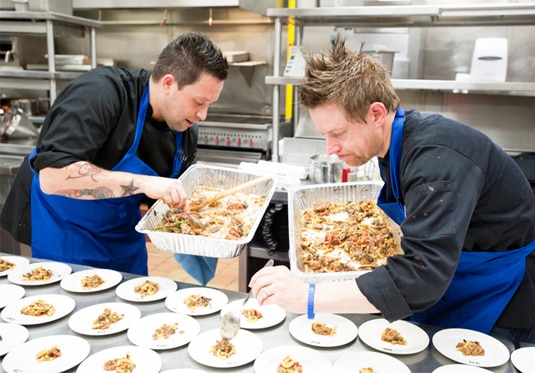Consistency is Key
Eli Kirshtein explains the importance of the consistency Quickfire Challenge.

Consistency is the hallmark of a great cook. Without consistency, there is little to no hope to having a quality and successful restaurant. Many legendary chefs, people like Ferran Adria and Thomas Keller, harp constantly on it being the linchpin of their cuisine and restaurant operations. Think about it: the concept and reason why it is important is amazingly rudimentary. If a chef creates a dish, in his or her own vision, in both presentation and flavor, if that is not what constantly comes out of the kitchen, then what is the point in the creation? Making sure a medium rare steak is always a medium rare steak is really important and traces back to the consistency of a cook. I remember hearing Chef Douglas Keene (who has been a judge on Top Chef a couple times, and his restaurant Cyrus in Healdsburg hosted the Season 6 finale) say something along the lines of, “Once you have consistency, you can do anything you want.” It just goes to really emphasize the basic nature of it for a serious chef.
Both of the teams made smart decisions with their dishes. Easy to plate and put together quickly. Crowd-pleasing and approachable concepts. They both hit the nail on the head of the goals of consistent cooking; flavor, temperature, and aesthetic were the same on all the plates. Either one could have won the challenge but I think that the choice to go with very bold flavors won the day on this one.
Lets talk about conch. The ones that are most often eaten in the Bahamas is a variety called a Queen Conch. It is a crazy aquatic animal to say the least. It is technically an aquatic snail that behaves in a pretty comparable way to the land version. It lives in its shell, and slugs around very slowly on the seafloor, in usually very shallow waters. In The Caribbean it is a staple of everyday eating, as well as everyday culture. You can see pictures of it, or the shells, just about everywhere in the West Indies. In respect to food, it is cooked in practically every way you can think of, it's fried in fritters, cooked in stews, even sliced and served raw. It can also be very challenging to cook. It has a naturally tough texture, think like a very large clam, so you need to either cook it tactfully or slice it carefully. And all of that is with out regard to the difficulties associated with the removing of the meat from the shell. But in my opinion I do think the work is worth the reward. I personally find the texture and flavor really good.With all that being said, I think it is really important to talk about how dire conch fisheries are worldwide. Due to a very slow grow time, as well as a fleeting natural habitat, they have become over fished very quickly. There are only a few countries that keep quality data on conch populations, and even fewer have done anything to curb illegal and excessive fishing. In the U.S. we have made very aggressive moves to help preserve the fishery, which is mainly based in the Florida Keys. There are a few sustainable conch fisheries based down in the Bahamas and I would feel confident with Top Chef’s drive towards ethical food, that the conches that were offshore had an origin in one of these farms.
Considering how daunting the challenge was with all the curveballs throw at them, the chefs really did a great job.Very rarely do you see Tom openly compliment the whole group as to having done well. In the end chefs do have to get eliminated sooner or later. We are down to three and they all seem to still be cooking really strong food. It is anyone’s game.
Follow me on Twitter at http://www.twitter.com/elikirshtein



